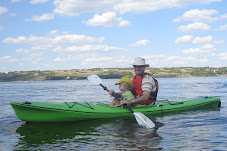RSS (really simple syndication) is a technology which allows you to keep track of web content that you are interested in using a feed reader like Bloglines or Google Reader. Instead of visiting your favourite sites and retrieving the information yourself, you can subscribe to the content and be alerted whenever content is updated. That way, the web comes to you, not the other way around.
This video does a really nice job of explaining what RSS is all about, and how it should make keeping up to date a whole lot easier...
Wednesday, January 30, 2008
Monday, January 28, 2008
A brief reflection on blogging
At Weblogg-ed 'real' blogging is described as writing that has “Links with analysis and synthesis that articulates a deeper understanding or relationship to the content being linked [to] and written [about] with potential audience response in mind.” In other words, blogging is about reading or researching, referencing, reflecting, synthesizing and recording for future reference, with some potential audience in mind. Some educational uses of blogs therefore come closer to this ideal use of blogs than others, as summarized in an earlier post in the same blog.
At one end of this scale is 'Posting assignments' which is not considered to be blogging. At the other end of the scale is 'Extended analysis and synthesis over a longer period of time that builds on previous posts, links and comments' which is considered to be complex blogging. My feeling is that the read and response task that we are doing at present offers some potential for more 'complex blogging', but that to some degree you need to think about what that is before you can engage in it. As we keep doing this activity over the course of the semester, it would be interesting to think about how you could motivate your own students to engage in this kind of blogging, as Venus asks. Let me know your thoughts.
At one end of this scale is 'Posting assignments' which is not considered to be blogging. At the other end of the scale is 'Extended analysis and synthesis over a longer period of time that builds on previous posts, links and comments' which is considered to be complex blogging. My feeling is that the read and response task that we are doing at present offers some potential for more 'complex blogging', but that to some degree you need to think about what that is before you can engage in it. As we keep doing this activity over the course of the semester, it would be interesting to think about how you could motivate your own students to engage in this kind of blogging, as Venus asks. Let me know your thoughts.
Sunday, January 27, 2008
Edunation in Second Life
Last week, there was some interest in how CALL might develop in virtual environments or as a form of 'virtual reality CALL' as one person put it. Gavin Dudeney (http://blog-efl.blogspot.com/) is currently advertising a 'series of educational talks, visits and other events to be held at the island of Edunation III in Second Life'. You can find details about these events here, if you are interested. Second Life is a kind of Mulit-user virtual environment (MUVE), similar to a lot of the online games our students play, but it's less of a game and more of a virtual world, with it's own economy and social life. The Edunation project seems to focus on providing students with a virtual self-access centre. I haven't tried it out, and I'm not a gamer, so if any of you do visit, leave a comment and let me know what you think of it.
Subscribe to:
Comments (Atom)
